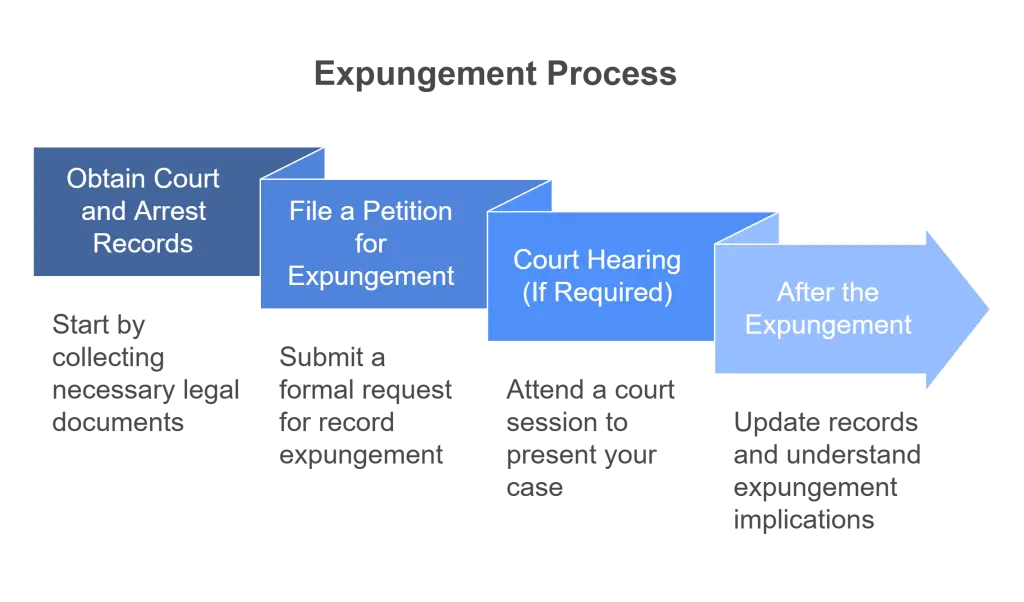Expungement is a legal process that allows individuals to clear their criminal records. It’s like erasing a mistake from your past. For many in California, expungement can open doors to better jobs, housing, and other opportunities that might otherwise be out of reach due to a criminal record. California has specific laws for expungement, which have seen changes in recent years. This guide will help you understand these laws and whether you're eligible for expungement. It's designed for individuals in California looking to clean their criminal records and improve their prospects.
Key Takeaways
- Eligibility Criteria: Individuals convicted of misdemeanors or felonies not resulting in state prison sentences may be eligible for expungement, provided they have completed probation, paid all fines and restitution, and are not currently facing criminal charges.
- Legal Process: The process involves filing a Petition for Dismissal with the court, which, if granted, reopens the case, sets aside the plea, and dismisses the case, effectively changing the finding of guilt to a dismissal.
- Limitations: Expungement does not erase the criminal record entirely; the record will show that the case was dismissed after conviction. Additionally, certain offenses, such as serious sex crimes, are not eligible for expungement.
- Benefits: A successful expungement allows individuals to legally state that they have not been convicted of the expunged offense, which can enhance employment prospects and access to housing. However, expunged convictions may still be considered in subsequent criminal proceedings.
- Juvenile Records: Juvenile criminal records are not automatically expunged and require a separate petition to have them sealed, which can typically be done upon reaching the age of 18.
Understanding Eligibility for Expungement in California
Convictions vs. Arrests
In California, not all criminal records can be expunged. It's essential to understand the difference between convictions and arrests. Convictions are cases where you've been found guilty of a crime, while arrests mean you were taken into custody but not necessarily convicted. Expungement typically applies to convictions rather than arrests, making it crucial to know your record. However, under certain circumstances, even arrests can be sealed or dismissed. Knowing these distinctions helps determine your eligibility for expungement.
EXPERT INSIGHT: Having a clean slate is something many strive for, especially in one's personal and professional life. It's about starting fresh, free from past mistakes and missteps. In the working world, this opens up new opportunities not just for the individual, but also for future generations in their family. By clearing their records, individuals can access better job prospects, higher wages, and improved stability, creating a positive ripple effect that benefits their loved ones. Read the article to find out more about how to go about expungement in the state of California and take the first step towards a brighter future. - Emile Garcia, SHRM-SCP, CHRP, CHRBP
Types of Offenses Eligible
- Misdemeanors: Most misdemeanor offenses in California are eligible for expungement. This includes common misdemeanors such as petty theft, public intoxication, and simple assault. Expunging a misdemeanor can significantly improve your chances of finding employment and housing.
- Felonies Reduced to Misdemeanors: Some felonies can also be expunged if reduced to misdemeanors through a legal process. This often involves a petition to have the felony reduced based on good behavior or other criteria.
- Certain Felonies: Not all felonies qualify for expungement. However, specific felonies may be eligible under California law, mainly if they are non-violent or lower-level felonies. Checking the list of eligible felonies is crucial before proceeding with your expungement application.
Waiting Periods
You can't apply for expungement immediately after your sentence ends. There is a waiting period that varies based on the type of offense and completion of your sentence. Typically, you must wait until all terms of your sentence are completed, including probation. For some misdemeanors, the waiting period might be shorter, while felonies often require a longer wait. Understanding these waiting periods ensures you apply at the right time, increasing your chances of success.
Probation and Parole
If you are on probation or parole, you must complete these terms before seeking expungement. This includes meeting all conditions set by the court, such as attending required programs or avoiding new offenses. Failing to complete probation or parole can disqualify you from expungement. In some cases, you might be able to petition the court for early termination of probation to expedite your expungement process. Ensuring all terms are met is essential for a successful expungement petition.
Completion of Sentence
Before applying for expungement, you must fulfill all obligations related to your sentence. This includes paying fines, restitution, and completing community service or rehabilitation programs. You can move forward with the expungement process only after these requirements are met. Neglecting any part of your sentence can lead to denying your expungement petition. Ensuring all aspects of your sentence are completed demonstrates responsibility and readiness for a fresh start.

The California Expungement Process: Step-by-Step

1. Obtain Court and Arrest Records
Start by getting copies of your court and arrest records. These records are essential for your petition and provide the necessary case details. You can request these records from the court or the police department that handled your case. There might be fees involved, so be prepared to cover these costs. Having accurate and complete records helps ensure your petition is thorough and correct. This step lays the foundation for a successful expungement application.
2. File a Petition for Expungement
Next, you'll need to file a petition for expungement. This involves determining the proper court to file in and accurately filling out the necessary forms. It’s crucial to avoid common mistakes like incomplete forms or missing information, as these can delay or derail your petition. Legal assistance can be beneficial to ensure everything is done correctly at this stage. Submitting a well-prepared petition increases your chances of a favorable outcome.
3. Court Hearing (If Required)
Some cases require a court hearing to determine if your expungement will be granted. You should know that the judge will review your petition and ask questions about your case and rehabilitation. It's essential to gather all necessary documents and be ready to explain why you deserve expungement. Potential outcomes include the judge granting or denying your petition based on the evidence and your situation. Proper preparation can make a significant difference in the hearing’s outcome.
4. After the Expungement
If your petition is granted, you’ll need to update your records. This includes informing agencies like the DMV and ensuring your record reflects the expungement. Understanding what "expunged" means is also crucial: while the record is cleared, some government agencies might still access it. Expungement provides significant benefits but is not an absolute erasure of all history. Knowing the scope of your expungement helps you manage future expectations and actions.
Benefits of Expungement in California

Employment
Expungement can significantly expand your job opportunities. Many California employers conduct background checks, and a clean record improves your chances of getting hired. You can compete more fairly in the job market without a criminal record. Additionally, expungement can open doors to jobs that require background checks, like those in education or healthcare. Overall, it can significantly enhance your career prospects and financial stability.
Housing
Landlords often perform background checks as part of the rental process. An expunged record can help you secure better housing options by removing barriers posed by past convictions. This means you can access a broader range of rental properties and improve your living conditions. With an expunged record, you might also have better chances of being approved for home loans. Clearing your record can thus provide more stable and favorable housing opportunities.
Education
Expungement can positively impact your educational opportunities. You can access more financial aid and unavailable scholarships with a clean record. Many academic institutions conduct background checks for admissions and housing; an expunged record can facilitate acceptance. This means you can pursue higher education with fewer obstacles. Additionally, you can participate more freely in campus activities and programs that might have restrictions for those with criminal records.
Licensing
Specific professional and occupational licenses require a clean record. Expungement can help you qualify for these licenses, essential for healthcare, law, and finance careers. You can easily apply for and maintain these licenses without a criminal record. This can lead to better job opportunities and career advancement in your chosen field. Expungement can thus play a crucial role in achieving professional success and stability.
Other Benefits
Expungement can also impact travel, immigration status, and more. For instance, some countries restrict entry for individuals with criminal records, and expungement can facilitate travel. It can also positively affect your immigration status, making obtaining visas or permanent residency easier. Overall, expungement provides a fresh start in many aspects of life, allowing you to move forward with fewer legal and social barriers.
Common Misconceptions and Mistakes

Automatic Expungement
Many believe expungement happens automatically, but this is a myth. You must actively petition the court for expungement; it doesn’t occur without your initiative. This misconception can lead to missed opportunities to clear your record. Understanding the need for action is the first step toward a successful expungement. Educating yourself on the process and taking the necessary steps is essential.
DIY vs. Attorney
While you can file for expungement, seeking legal help can ensure the process is done correctly. Attorneys are familiar with the legal system and can help avoid common pitfalls. They can also provide valuable advice and representation during court hearings. While hiring an attorney involves costs, the benefits often outweigh these expenses. Professional assistance can significantly improve your chances of a successful expungement.
Record Sealing vs. Expungement
Expungement clears your record, but sealing means it's hidden. Understanding these key distinctions is crucial. While both processes offer benefits, they serve different purposes and have other legal implications. Expungement typically provides broader relief than sealing. Knowing which method suits your needs ensures you take legal steps to clear your record.
Timeline Expectations
The expungement process can take time, so patience is essential. Managing realistic timelines helps set proper expectations and reduce frustration. Delays can occur due to court schedules, paperwork processing, or additional requirements. Preparing for a potentially lengthy process can help you stay focused and persistent. Patience and persistence are vital to navigating the expungement process successfully.
Frequently Asked Questions (FAQ) about California Expungement
How to Expunge Your Record for Free in California
Expunging your record for free in California is possible if you qualify for fee waivers. To do this, you must demonstrate financial hardship. Start by filling out a fee waiver application, which you can find at the court where you're filing your expungement petition. Many legal aid organizations provide free assistance or guidance on expungement. Some non-profits and community organizations offer workshops and support to help you through the process.
How to Expunge a DUI in California Yourself
To expunge a DUI in California yourself, follow these steps:
- Obtain your criminal records, including the court docket and case information.
- Complete the necessary forms, such as the Petition for Dismissal (Form CR-180) and the Order for Dismissal (Form CR-181).
- File these forms with the court that handled your DUI case.
- Serve the district attorney and probation department with copies of your petition.
- If required, attend the court hearing, where the judge will decide on your expungement. Ensure all paperwork is accurate and complete to avoid delays.
How to Expunge a Felony in California for Free
Expunging a felony in California for free involves similar steps to expunging other offenses. Begin by applying for a fee waiver to cover court costs if you have financial difficulties. Complete and file the necessary forms with the court, such as a Petition for Dismissal (Form CR-180) and an Order for Dismissal (Form CR-181). If your felony needs to be reduced to a misdemeanor first, file a petition to reduce the felony under Penal Code 17(b). Seek assistance from legal aid organizations or non-profits that offer free legal help for expungement.
How to Expunge a Misdemeanor in California
To expunge a misdemeanor in California, follow these steps:
- Obtain your court records related to the misdemeanor conviction.
- Fill out the Petition for Dismissal (Form CR-180) and the Order for Dismissal (Form CR-181).
- File these forms with the court that handled your case, ensuring you serve the district attorney with copies.
- Attend a court hearing, if required, where the judge will review your petition. Ensure all your sentence requirements, including probation, fines, and restitution, are completed before applying.
What is the New Expungement Law in California?
The new expungement law in California, AB 1076, automatically clears eligible criminal records for individuals who have completed their sentences without requiring them to file a petition. This law aims to streamline the expungement process and reduce the burden on individuals seeking to clear their records. It applies to certain misdemeanors and low-level felonies and went into effect on January 1, 2021. However, not all offenses are covered, so verifying whether your conviction qualifies under this new law is essential.
What is an expungement in California?
An expungement in California is a legal process that allows individuals to have their criminal convictions dismissed, effectively setting aside the guilty verdict and entering a not guilty plea, resulting in the case being dismissed.
Who is eligible for expungement in California?
Individuals convicted of misdemeanors or certain felonies who have successfully completed probation, parole, or jail time, and have fulfilled all court-ordered obligations, may be eligible for expungement. However, some offenses, particularly serious felonies, may not qualify.
What offenses cannot be expunged in California?
Certain serious offenses, such as specific sexual crimes involving minors, cannot be expunged in California. It's important to consult legal resources or an attorney to determine the eligibility of a specific offense.
How does an expungement affect my criminal record in California?
Once an expungement is granted, the conviction is dismissed, and you can legally state that you have not been convicted of that crime. However, the record of the case remains, but it is updated to show the dismissal.
Does an expungement remove the conviction from public records in California?
No, an expungement does not remove the conviction from public records entirely. The record will indicate that the conviction was dismissed, but the original record remains accessible.
Can an expunged conviction be used against me in the future in California?
An expunged conviction can still be considered in certain circumstances, such as during sentencing for future offenses or when applying for specific professional licenses. It does not completely erase the conviction from all records.
How long does the expungement process take in California?
The duration of the expungement process can vary depending on the complexity of the case and the court's schedule, typically ranging from a few weeks to several months.
Do I need an attorney to file for expungement in California?
While it is possible to file for expungement without an attorney, seeking legal assistance can help ensure that the process is completed accurately and efficiently, increasing the likelihood of a successful outcome.
What is the cost associated with filing for expungement in California?
The cost of filing for expungement varies by county and may include court filing fees and, if you choose to hire one, attorney fees. It's advisable to check with the local court for specific fee information.
Can employers in California see expunged convictions?
In most cases, private employers cannot see expunged convictions during background checks. However, certain government agencies and organizations may have access to expunged records.
Conclusion
Expungement offers a valuable opportunity for a fresh start. By understanding the eligibility requirements and process, you can take steps toward clearing your record. If you're considering expungement, don't hesitate. Seek legal assistance if needed and take control of your future. This guide aims to provide a comprehensive understanding of the expungement process in California. By following the steps outlined, you can work towards a clean slate and new opportunities.
Still have questions?
Get in touch with our team today for a personalized demo and discover how our tailored volume pricing and packages can drive results for your business!
How useful was this page?*
Note: your comments are anonymous. We use them to improve the website. Do not include any personal details.
Visit our FCRA Compliance Tool or leave a message here if you need a response.
From the blog Explore the GCheck Content Hub

How Long Do Background Checks Take for Government Jobs? Timeline Expectations for 2026
6 Jan, 2026 • 20 min read
Driver Qualification File Requirements: Your Complete DOT Compliance Guide
6 Jan, 2026 • 18 min read
Healthcare Background Screening Costs: 2026 Budget Planning Guide for Medical Facilities
30 Dec, 2025 • 23 min readThe information provided in this article is for general informational and educational purposes only and should not be construed as legal advice or a substitute for consultation with qualified legal counsel. While we strive to ensure accuracy, employment screening laws and regulations—including but not limited to the Fair Credit Reporting Act (FCRA), Equal Employment Opportunity Commission (EEOC) guidelines, state and local ban-the-box laws, industry-specific requirements, and other applicable federal, state, and local statutes—are subject to frequent changes, varying interpretations, and jurisdiction-specific applications that may affect their implementation in your organization. Employers and screening decision-makers are solely responsible for ensuring their background check policies, procedures, and practices comply with all applicable laws and regulations relevant to their specific industry, location, and circumstances. We strongly recommend consulting with qualified employment law attorneys and compliance professionals before making hiring, tenant screening, or other decisions based on background check information.


